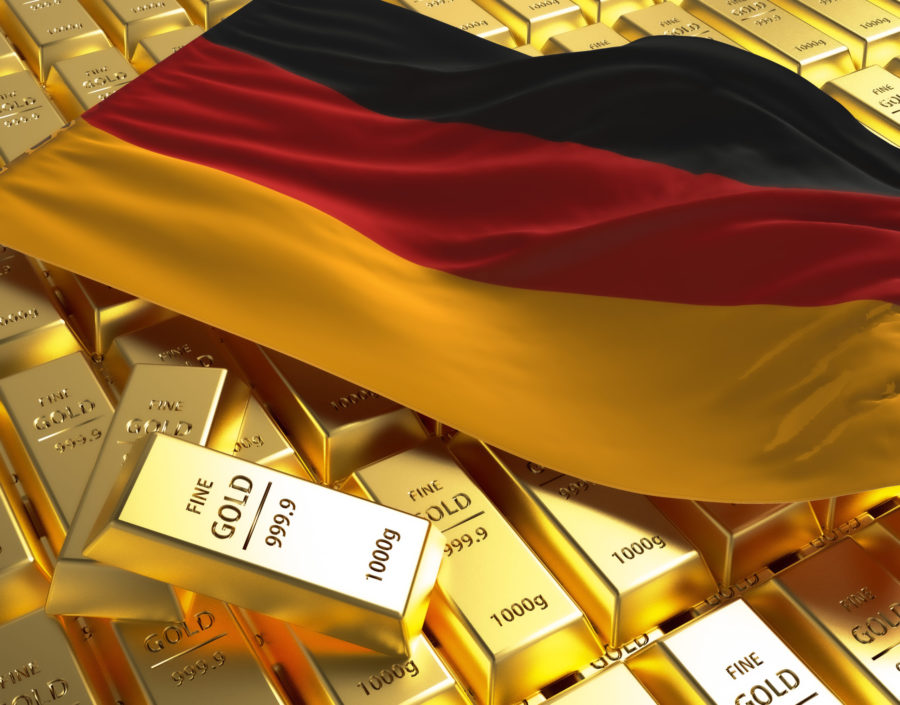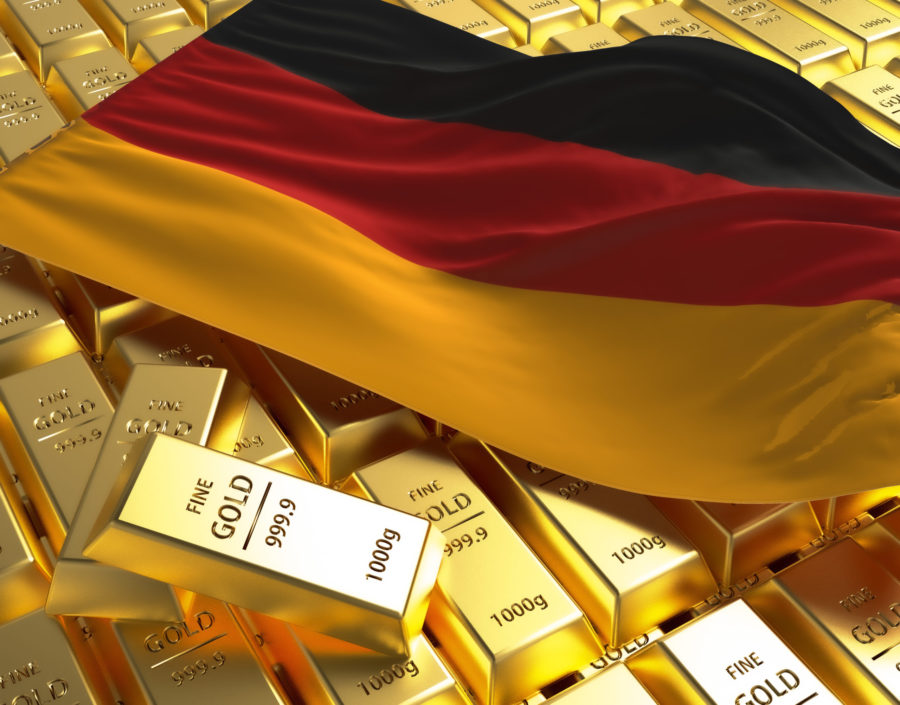Germany may look to withdraw its gold from US
Germany may look to withdraw its gold from US

Germany may look to withdraw its gold from US

Germany may look to withdraw its gold from US

Germany may look to withdraw its gold from US

You're viewing a single thread.
Why are they storing it there ? easier to sell it when need to ?
I'd expect it's a Cold War thing. When Germany (or West Germany, at the time) was concerned that it could be the frontline of WW3 at any moment, it probably wanted somewhere to keep its gold reserves that wouldn't be captured. The current German gold reserve is the second largest of any in the world, so on the assumption that at least most of that was from West Germany then it'd be a huge thing to capture in the event of war. If it could magically all be sold at the current London gold fix price, it'd be worth well over 300 billion USD
I think this is not correct. This gold was never on German soil. It is the result of trade surplus of sold goods, exchanged from USD to gold.
What you say is true however for German gold in England and at one point France.
That's really interesting. So what you're saying is, Germany sold more to the states than they bought, but the states were able to "keep" the money by marking off that Germany had so much gold.
And I guess now, Germany is concerned that the states may no longer honour that ledger.
Germany can't be more concerned than before. I expect that the publicity is a chip in the current trade negotiations that must be happening after Trump announced the tariffs.
That is how trade works in general.
If the US buys more stuff from you than you buy from them, you have excess US dollars. What happens with those US dollars? Does the US put pallets of US currency on airplanes and send them to you? No. Typically, you invest them in the US. At a minimum those dollars end up as deposits in US bank accounts in US banks.
Did you ever wonder how counties like China or Japan ended up with over a trillion dollars each worth of US treasury bills? US treasury bills are loans to the US government. Those came from trade. The US got to enjoy high quality Japanese cars and cheap Chinese goods AND the US government got to spend more money than they collected in taxes. Not a bad deal if you think about it.
If you have a trade deficit with a another country, you could reframe that as saying that the country has an investment surplus with you. Does that sound better?
Or, instead of saying that you are going to eliminate your trade deficit, you could instead say that you are going to eliminate foreign investment. Does that sound good?
One of the things you could buy off the US with your excess dollars is gold. But then the US gets to keep the money (and maybe the gold too).
Instead of investing your excess US dollars directly in the US, you could sell those US dollars to invest somewhere else of course. But all this does is move the money to somebody else who then has the same problem (excess US dollars). At the end of day, US dollars have to get spent in the US. You either buy goods from the US (trade) or invest in the US (capital). In aggregate, any trade deficit has to be balanced by a capital surplus.
I said above that you could just park your excess US money in a US bank. If you do that, the US bank will loan that money out to collect interest. Except due to how “fractional” banking works, they will loan more money than you deposit, creating big interest inflows (in US dollars), creating wealth in the US from the money the US spent buying stuff abroad. If other countries are taking out these loans, the interest payments are considered “services”. You may have heard that the US has moved from a manufacturing economy to a services economy. This is an example.
Of you could buy other “services”, like paying US “experts” for their expertise or US software companies for software or time in their “cloud”. You send the US cars and T-shirts. They send you “experts”, Microsoft Office, social media, and advertising. And if you do not buy enough experts and software, the resulting “trade deficit” ends up in a US bank account or stock market where the US financial system will use it to create US wealth out of thin air (because that is what fractional banking and stock markets do). The bugger the trade deficit, the more money there is to drive that cash fly-wheel.
But what if you just bought gold? Did not putting the money in a US bank stop the fly wheel? Well, first of all, you are probably paying the US for security and some insurance company too. There are a couple more services the US gets to sell you on their “debt”. But you can bet somebody has “levereged” that gold by borrowing against it to invest. They were probably able to do that on “margin” which puts us back in that “fractional”, money from nothing system we talked about earlier. And the “money” we are talking about here of course is US dollars. What do we do with those? See above.
But don’t begrudge the US the wealth they create from your investments in the US. After all, those “excess” US dollars from the original trade deficit made you rich too. Ask Norway.
Trade makes counties rich. Modern financial markets and other “services” amplify that wealth. The US is the richest country in the world. They didi not get that way by getting “ripped off” by everybody. It is too bad more people do not understand the system that has made them so rich.
How would that work exactly? Trade surplus is just an accounting balance. It's the difference between what US importers paid for German goods and what German importers paid for US goods. The money went to the companies involved, how would it be used to buy gold for the German state?
It's mostly a result of Bretton-Woods. Countries with a trade deficit had to pay those with a surplus -mostly in gold. And because shipping gold is expensive, that gold stayed in the USA. The German central bank had 24 tons in 1950 but 4000 tons by 1951.
Interesting, didn't know that about Bretton-Woods (or probably forgot), thanks for the info!
Yeah me neither, Wikipedia reminded me, there's and entire entry to the acquisition of gold by the German government
To keep it simple, imagine your group of importers and exporters. The exporters have excess US money from the trade imbalance. Now imagine they “sell” those US dollars to the German government in return for German currency (I guess Euros these days). Now the German government has a bunch of US dollars. What do they do with them? Buy gold?
Imagine that there is only one bank in Germany and it is owned by the government. The bank “borrows” Euros to buy the US dollars off the importers. Imagine they borrow it from the European Central Bank (ECB). But then the importers deposit the Euros in the bank. The bank now has excess Euros from deposits equal to the money they borrowed. So, they pay the ECB back. Now the bank “owes” those companies Euros. They will have to pay that money back if the companies withdraw their deposits. So, now the German government has a bank that “owes” the value of its deposits AND they have a pile of US dollars. They can now go buy a bunch of gold with those US dollars and keep it in a vault in New York.
Of course, even though the gold is backing those deposits in the German bank, the German bank can still creates loans against the deposits they have. In fact, due to fractional banking, they can loan out way more than that. So, the money those German companies deposited into the German bank will make the German bank rich (even though the bank already spent the money on US gold). By the time those companies go to withdraw their deposits, the German bank will have enough profit to pay them without having to sell the gold. This is because the German economy has grown enough to pay them. Plus, they are probably going to spend it in Germany with somebody who will just deposit it again at the bank. So, the money never really leaves the bank. Which is why we can loan it out (even if we don’t have it). Wonderful stuff.
You can make it more complicated by making more banks that take deposits from the individual German companies in a more distributed way and that borrow from each other or from the “central” bank. You can say that not all the companies deposit their trade surplus but instead spend it with or invest on other German companies. But that just moves the money around. In the end, it works like above. All the deposits make it back to the central bank eventually. Even if the US dollars get converted to Euros in 1000 places, it all becomes Euros in the local economy and foreign investment by the government eventually. So, we can simplify and pretend that trade surpluses and deficits between economies are between the countries directly (government to government).
It is really central bank to central bank though. So, if all the German companies above decide to exchange their US dollars for Euros at French banks instead of German ones, it gets more complicated. But you get the idea.
You store gold reserves at banking/trading/stock exchange hubs, so that it can be easily exchanged for foreign currencies - especially without actually moving it. This way you have access to funds in case your own currency is in trouble (e.g. your country is at war).